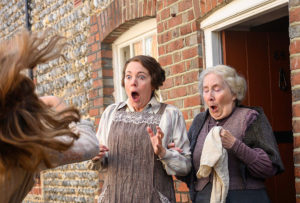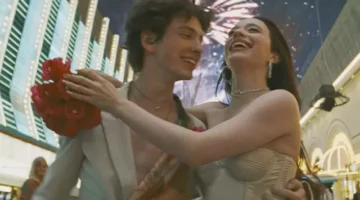Tropic Sprockets / Wicked Little Letters
By Ian Brockway
Thea Sharrock (Me Before You) takes a minor incident from history and makes hay out of it in “Wicked Little Letters.” Whether such letters are wicked enough is now, in hindsight, up to the reader.
In Littlehampton, England in 1918, Edith Swan became agitated over her neighbor Rose Gooding’s overflowing garbage cans, and Rose in turn didn’t like the unsavory smell of the rabbits that the Swans kept for meat. Edith soon learned of Rose’s use of expletives, and I won’t spoil the turn of events, but the rest is a matter of police record.
The trouble, one can guess, is not a knife, a gun or even a sprinkle of arsenic, but a series of poison pen letters spread throughout Littlehampton. Sharrock treats what could have been almost Hitchcockian intrigue and paranoia but opts to deliver the drama with a quirky light touch.
Spinster Edith (Olivia Colman) is a fanatical Christian who lives with her gruff sourpuss of a father (Timothy Spall). Edith’s altruistic heart reaches out to the younger bawdy and independent neighbor Rose (Jessie Buckley) who is beset with hardship having lost her husband.
Rose is stubborn and refuses Edith’s courtesies.
Then Edith gets a very shocking surprise in the mail: a letter and a postcard filled with horrid profanity, including the words starting with the letters F and C but not limited to the letter S. Edith is speechless in horror. More expletive-laden letters follow, frequently beginning with the adjective “foxy.” Edith jumps to conclusions and files a complaint with child protective services who show up at Rose’s door.
The letters continue to arrive in Edith’s post. Then other residents receive letters.
Edith has difficulty breathing and her dad’s face pickles with rage.
Certainly, the writer must be the wayward, blue-tongued Rose.
The events are played for fun and laughs with the residents of Littlehampton taking deep breaths, wincing, and turning beet red over the filthy four-letter words. This is one joke that is comical at first but starts to become overplayed.
The push and pull between Edith and Rose is similar to a “Dennis the Menace” comedy rather than real pathos, but Buckley and Colman are excellent even if their expressions are limited by the plot.
The effect of this history on film is more Benny Hill than Oscar Wilde with the straitlaced prim and proper town getting flummoxed and flustered by the “filthy” language, with perspiring and tomato-faced barristers.
The most intriguing aspect in the film is the character of Edith Swan herself, but as the court proceedings unfold there is little psychological insight into her being and ego. Too much energy is spent treating the episodes as a whodunnit montage of hijinks with apoplectic reaction-shots and knocks on the head, not to mention cuddles with a hen laying a fresh egg.
Lovers of light fare will get a few chuckles here with plenty of bashful countenances to guffaw upon but given that the main draw is the bizarre character of Edith Swan herself, the film could have benefitted from a darker, slightly more sinister tone.
Write Ian at [email protected]
[livemarket market_name="KONK Life LiveMarket" limit=3 category=“” show_signup=0 show_more=0]





No Comment